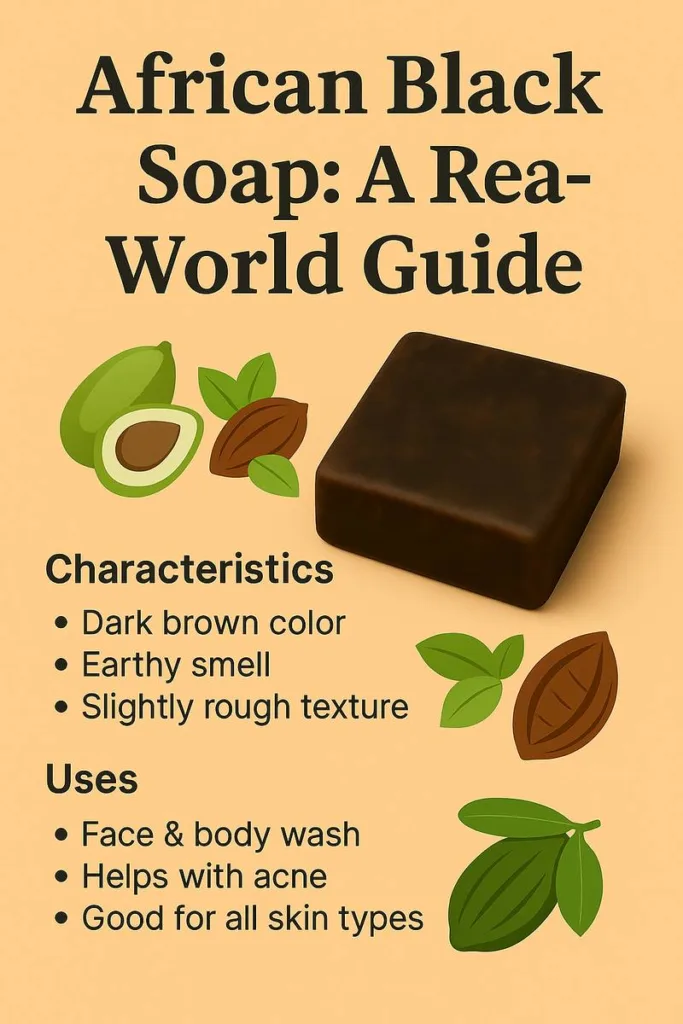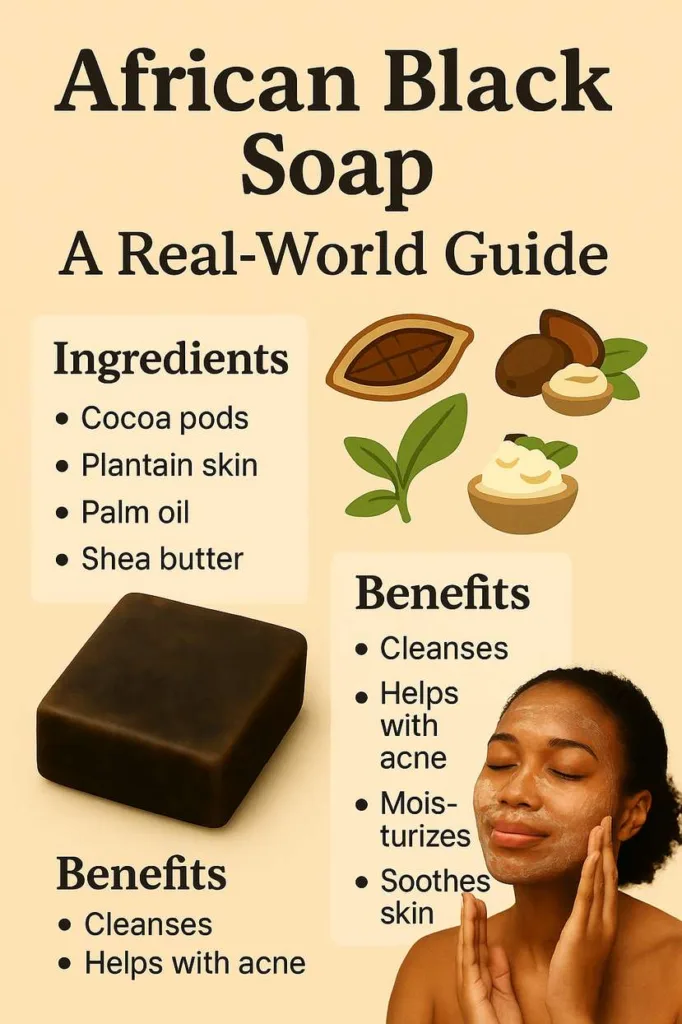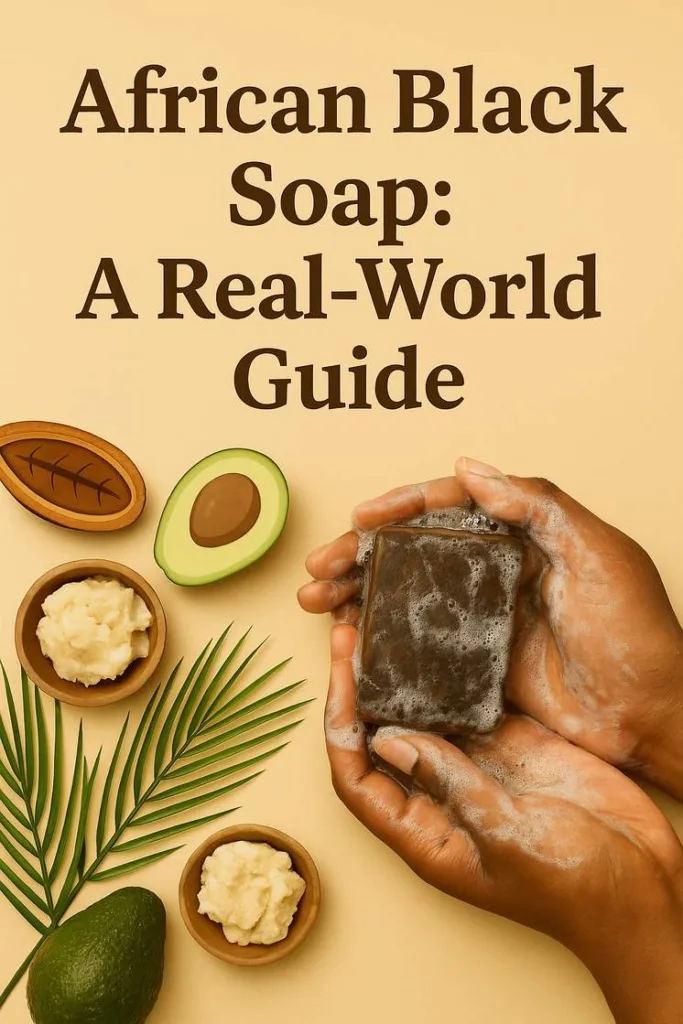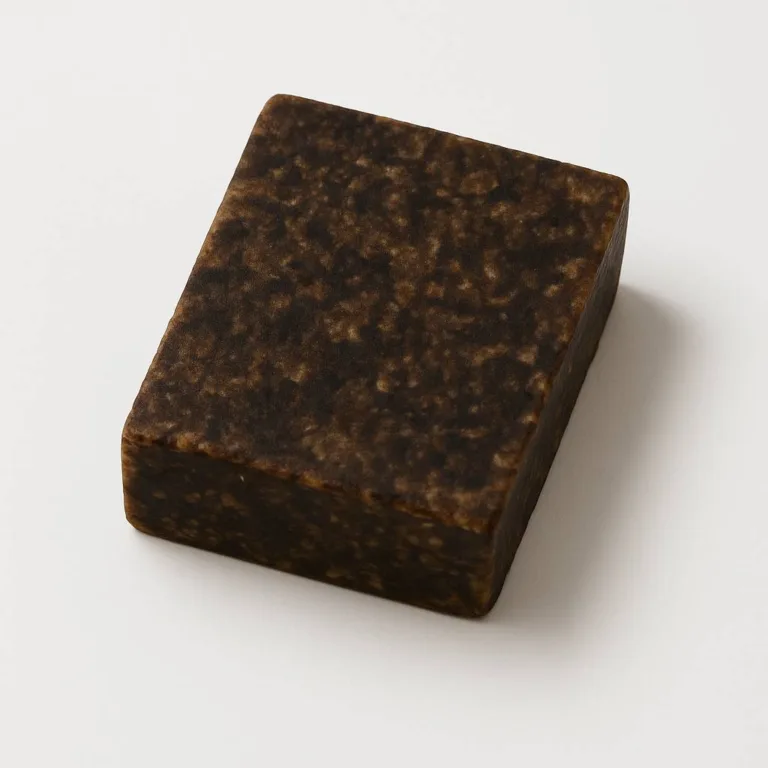If you’ve scrolled through skincare TikTok lately, you’ve probably seen African black soap touted as everything from an acne miracle to a hyperpigmentation eraser. But here’s the thing—I’ve been using it for over two years, and while it’s genuinely effective for certain skin concerns, it’s not the cure-all some influencers claim. This guide cuts through the hype to give you the real story about what this traditional soap can (and can’t) do for your skin.

What Is African Black Soap?
Origins (Ghana, Nigeria; traditional methods)
Authentic African black soap, known as “ose dudu” in Yoruba or “alata samina” in Twi, has been crafted in West African communities for centuries. I first learned about its true origins from a Ghanaian friend whose grandmother still makes soap using recipes passed down through generations. The traditional process involves burning plantain skins, cocoa pods, and palm leaves to create ash, which is then mixed with oils and shea butter.
What struck me most during my research was how each family has slight variations in their recipes—some add more shea butter for moisturizing, others include specific herbs for different skin concerns. This isn’t mass production; it’s artisanal craftsmanship with deep cultural roots.
Traditional vs. mass-market versions (texture, color, pH differences)
Here’s where things get tricky. Authentic black soap looks nothing like the perfectly smooth, uniformly colored bars you’ll find in most beauty stores. Real black soap is actually brown or dark gray, with an uneven, slightly crumbly texture that might have white or lighter streaks marbled throughout. It feels rough to the touch and can vary in hardness.
The pH difference is significant too. Traditional black soap tends to be more alkaline (around pH 9-10), which explains its powerful cleansing properties but also why it can be harsh if not used properly. Mass-market versions often add synthetic ingredients to lower the pH and create a milder product, but this changes the fundamental nature of what makes African black soap unique.
Key Ingredients & Why They Matter
Plantain skins/cocoa pod ash (alkaline cleansing)
The magic of African black soap lies in its ash content. When plantain skins and cocoa pods are burned, they create potassium hydroxide—a natural saponifying agent that gives the soap its cleansing power. This is why authentic black soap feels more “detergent-like” than your typical gentle cleanser.
I remember being surprised by how clean my skin felt after first use, almost squeaky clean. That’s the ash working to break down oils and impurities. However, this same alkalinity can disrupt your skin barrier if you’re not careful about frequency and follow-up care.
Shea butter & palm kernel/coconut oil (emollients)
Thankfully, traditional recipes balance the harsh cleansing action with moisturizing ingredients. Raw shea butter and palm kernel oil provide essential fatty acids that help maintain some level of hydration during cleansing. In my experience, soaps with higher shea butter content feel less stripping on the skin.
The quality of these oils matters enormously. Authentic versions use unrefined, locally sourced ingredients that retain more beneficial compounds compared to processed alternatives found in commercial products.
Fragrance/essential oils (pros/cons for sensitive skin)
Many artisanal versions include local herbs or essential oils like eucalyptus or tea tree. While these can provide additional benefits, they’re also potential irritants for sensitive skin. I learned this the hard way when I tried a version with added lemongrass oil and experienced some redness. If you have reactive skin, look for versions with minimal added fragrances.
Benefits (and What’s Overhyped)
Cleansing & mild exfoliation
African black soap excels at deep cleansing. The slightly gritty texture provides gentle physical exfoliation, while the alkaline pH helps dissolve excess oil and dead skin cells. After consistent use, I noticed my skin texture became smoother and my pores appeared less congested.
Oil control & acne support (what to expect, how long)
For oily, acne-prone skin, this soap can be genuinely helpful. It took about three weeks of consistent use (every other day) before I saw a noticeable reduction in breakouts. The key is managing expectations—it won’t clear severe acne overnight, but it can help with mild to moderate concerns when used as part of a complete routine.
Hyperpigmentation & texture (what it can/can’t do)
Here’s where I need to be honest: while the exfoliating action can help with surface-level texture issues and may gradually improve the appearance of some dark spots, African black soap isn’t a targeted hyperpigmentation treatment. The improvements I saw were subtle and took months, not weeks.
Claims to be skeptical about (miracle cures, “detox”)
Be wary of claims about “detoxing” your skin or curing serious skin conditions. Your skin doesn’t need detoxing—it has its own natural processes for that. African black soap is a good cleanser, not a medical treatment.
Who Should Use It

Oily/acne-prone
This is where African black soap truly shines. If you struggle with excess oil production and frequent breakouts, the deep cleansing action can help manage these concerns. Start with 2-3 times per week to assess tolerance.
Combination/normal
Those with combination skin might find it useful as a weekly deep-cleansing treatment, particularly in the T-zone. I use it this way during humid months when my skin tends to get oilier.
Dry/sensitive/eczema-prone (how to patch test, dilution)
Proceed with extreme caution. The alkaline nature can be too harsh for compromised skin barriers. If you want to try it, dilute a small piece in warm water to create a gentler solution, and always patch test on your inner arm first.
How to Use African Black Soap (Step-by-Step)
Patch test
Before using on your face, test a small diluted amount on your inner wrist. Wait 24-48 hours to check for any adverse reactions.
Lather in hands, not directly on face
Never rub the soap directly on your skin. Instead, work up a lather in your palms with warm water, then apply the foam to your face. This reduces the risk of irritation from the soap’s rough texture.
Contact time (short!), rinse well, moisturize
Keep contact time brief—30 seconds maximum. Rinse thoroughly with lukewarm water and follow immediately with a moisturizer. I can’t stress this enough: the moisturizing step is non-negotiable.
Frequency by skin type
Oily skin: Start with 2-3 times per week
Normal/combination: 1-2 times per week
Dry/sensitive: Once weekly maximum, if at all
My Routine & Results (Honest Take)
Skin type baseline
I have combination skin that tends toward oily in my T-zone, with occasional hormonal breakouts around my chin. I’ve always struggled with slightly enlarged pores and uneven texture.
What changed in 2–4 weeks
Within a month of using African black soap 2-3 times per week, I noticed less oil buildup by midday and fewer small breakouts. My skin felt cleaner without being stripped, though I had to experiment with different moisturizers to find the right balance.

What didn’t change & realistic expectations
My pore size didn’t dramatically change, and existing acne scars remained the same. The improvements were gradual and required consistent use. It’s a solid addition to a skincare routine, not a miracle worker.
Final Verdict: Is It Worth It?
African black soap is worth trying if you have oily or acne-prone skin and want to incorporate a traditional, minimally processed product into your routine. However, it requires patience, proper technique, and realistic expectations. Start slowly, listen to your skin, and remember that good skincare is about consistency and finding what works for your individual needs, not chasing the latest trend.
For those interested in supporting traditional craftsmanship while addressing specific skin concerns, authentic African black soap offers a unique combination of cultural heritage and practical benefits—just don’t expect it to solve all your skin problems overnight.
